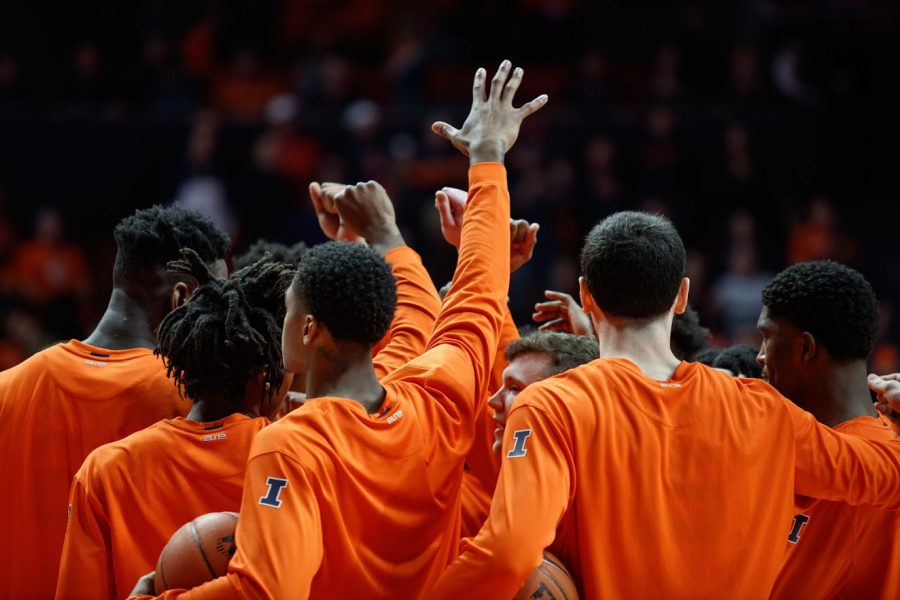Student-athletes adjust to remote learning
The Illinois Men’s Basketball team huddles before a match with Indiana on March 1.
May 17, 2020
The University of Illinois announced students would not return to campus for the final eight weeks of the spring semester due to the COVID-19 pandemic on March 16.
Students at Illinois and universities across the U.S. were forced to take classes online, which came with adjustments. Some classes met on the video communication service Zoom. Other classes professors were limited to publishing lecture videos to the classes specific website for students to watch. Moving classes to an online platform came with many difficulties for college students across the country.
The University of Illinois employs a staff of 20 full-time employees to assist student-athletes with their academic course work, in addition to part-time students who tutor student-athletes in classes.
“Student-athletes have lost structure in their days, they used to wake up at 6 a.m. have weights and sports activities and then go to class and practice in the afternoon and then night study sessions and night tutors; that has changed drastically.” said Dr. Brian Russell, who leads the academic charge for Illinois’ student-athletes at the Irwin Academic Center. “The loss of structure has forced them to reprioritize and get things done appropriately in the remote environment.”
The loss of structure has led to an adjustment in the requirements that student-athletes must meet. When student-athletes are on campus, many sports require students to spend a required number of hours in study hall a week, normally eight hours.
Get The Daily Illini in your inbox!
Since classes have moved to remote learning, sports have made adjustments for student-athletes moving to an objective system.
The objective system allows student-athletes to meet with academic counselors and learning specialists individually and focus more directly on the progress that the student-athlete is making with each individual class.
As the pandemic began to affect the U.S. officials at Illinois began to prepare for the possibility that students would not return from spring break. Academic Services began this process by surveying student-athletes on the amount of available technology in their homes. The survey determined that “the overwhelming majority” of student-athletes had access to a laptop and a Wi-Fi connection to connect to online work.
Dr. Russell said that students that didn’t have a computer or Wi-Fi connection were able to find solutions through the NCAA Student Assistance Fund.
The NCAA Student Assistance Fund provides money for universities to help student-athletes in academic areas when student-athletes don’t have the necessary tools to be successful in the classroom.
“We were able to use that fund to allow student-athletes to go out and get laptops very quickly for those that needed them and we were able to get them to students very quickly,” said Dr. Russell.
Illinois’ academic services department offered part-time tutors the opportunity to continue tutoring student-athletes remotely or to take a break from tutoring to focus on their own work. Many student-tutors at Irwin are students at Illinois, so tutors also had to balance their online classwork with tutoring student-athletes.
The connection between student-athletes and tutors was harmed greatly, said Dr. Russell, even though Zoom was found to be a useful mechanism of communication between student-athletes and tutors.
Friday was the last day of the 2019-20 academic year at Illinois, but summer classes are scheduled to begin on Monday, May, 18. Student-athletes often take summer classes to lessen the load of classes during their season, so the summer presents similar challenges for academic services.
As summer classes begin academic services goal remains to support student-athletes through their classwork.
“Having our student-athletes having a point of connection and consistency is important to them feeling supported,” said Dr. Russell.
@alec_busse






